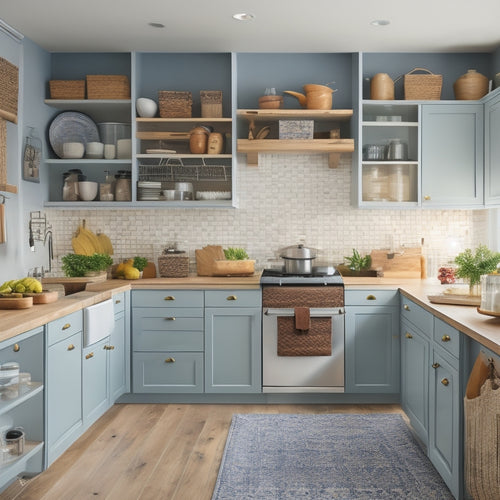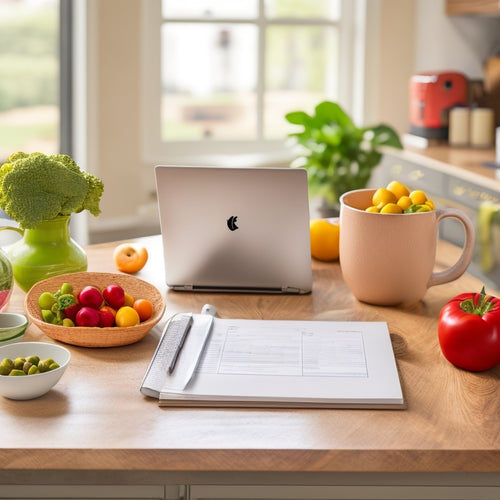
7 Essential Tips for Meal Prep Weight Loss Success
Share
You're about to immerse yourself in the world of meal prep weight loss, and with these seven essential tips, you'll be equipped with a proven strategy to reach your goals. Set realistic weight loss goals, focusing on a sustainable pace of 1-2 pounds per week, and celebrate milestones to stay motivated. Plan your meals strategically, prioritizing ingredient variety and incorporating lean proteins, healthy fats, and complex carbs. Shop smart, prepping in bulk to save time, and pack meals for on-the-go convenience. Track your progress, staying accountable with a food diary or mobile app, and be flexible, making adjustments as needed. By following these tips, you'll be on your way to weight loss success, and with a solid foundation in place, you'll be ready to elevate your progress to the next level.
Key Takeaways
• Develop a strategic meal plan that prioritizes ingredient variety, lean proteins, healthy fats, and complex carbs for sustainable weight loss.
• Prep ingredients in bulk and batch cook proteins and vegetables to save time and reduce food waste.
• Use airtight, leak-proof containers to pack healthy meals and snacks for on-the-go, and label and date containers for easy tracking.
• Track progress and stay accountable by monitoring food intake, exercise routine, and weight loss progress, and share goals with an accountability partner.
• Be flexible and make adjustments to meal prep strategies as needed, such as modifying recipes to suit personal tastes and replacing unhealthy habits.
Set Realistic Weight Loss Goals
When setting out to achieve weight loss success through meal prep, define realistic goals that align with your lifestyle and abilities, recognizing that a sustainable pace of 1-2 pounds per week is more effective in the long run than aiming for significant transformations.
This approach will help you stay motivated and focused on your journey. Celebrate milestones, no matter how small they may seem, as they'll keep you encouraged to continue.
On the other hand, don't be too hard on yourself when you encounter setbacks - reflect on them, learn from your mistakes, and move forward.
Having a support system in place is essential to your success. Seek support from friends, family, or a weight loss community to stay motivated and accountable. Share your goals with them and ask for their encouragement.
Plan Your Meals Strategically
Now that you've set realistic weight loss goals, it's time to develop a strategic meal plan that will help you achieve them.
A well-planned meal prep strategy is essential to weight loss success. You'll want to focus on meal timing and portion control to keep your metabolism boosted and hunger satisfied. Aim to eat three main meals and two to three snacks in between, spaced out every three to four hours. This will help regulate your appetite and energy levels.
When planning your meals, prioritize ingredient variety to make sure you're getting a broad range of nutrients. Experiment with different flavor combinations to keep your meals interesting and prevent boredom. Incorporate lean proteins, healthy fats, and complex carbohydrates into your meals to support weight loss.
Don't be afraid to get creative and try new recipes. A strategic meal plan will help you stay on track, reduce cravings, and increase your chances of achieving your weight loss goals.
Shop Smart and Efficiently
With a strategic meal plan in place, you're ready to stock your kitchen with healthy essentials, and shopping smart and efficiently is essential to saving time and money while staying on track with your weight loss goals. Now, it's time to put your plan into action and make intentional ingredient selections that align with your meal planning. This means choosing whole, unprocessed foods like lean proteins, whole grains, and a variety of colorful vegetables.
When you're at the store, stick to your list and avoid impulse buys to stay on budget. Consider shopping the perimeter of the store, where fresh produce, meats, and dairy products are typically located. By doing so, you'll save time navigating the aisles and reduce the temptation to grab unhealthy items.
Additionally, look for budget-friendly shopping options like buying in season, using coupons, and purchasing store-brand products. By implementing these time-saving strategies, you'll be able to stay focused on your weight loss goals while keeping your wallet happy.
Prep in Bulk to Save Time
You'll maximize your efficiency in the kitchen by prepping ingredients in bulk, a strategy that pays off in saved time and reduced food waste. This approach allows you to tackle meal prep in one session, rather than spreading it out over several days.
By dedicating a few hours to batch cooking, you'll have a stockpile of healthy ingredients ready to go. Consider prepping proteins like chicken, beans, or lentils, as well as vegetables like broccoli, carrots, or sweet potatoes. Once cooked, portion them out into individual containers and store them in the freezer for up to three months.
This way, you can grab what you need and assemble a healthy meal in no time. Freezer storage is key to making the most of your bulk prep. Just be sure to label and date each container so you can easily keep track of what you have on hand.
Pack Meals for On-the-Go
By assembling individual meals in portable containers, you're making sure that healthy eating stays on track even when your schedule gets busy. This way, you can easily grab a meal on the go, without having to compromise nutrition for convenience.
Packing meals ahead of time also helps with portion control, which is essential for weight loss success. When you prepare your meals in advance, you're more likely to stick to your planned portions, rather than relying on impulse snacks or oversized servings.
Here are some tips to keep in mind when packing meals for on-the-go:
-
Choose containers that are airtight, leak-proof, and easy to transport
-
Pack healthy snacks like nuts, fruits, and energy bars to satisfy cravings
-
Consider investing in a portable cooler bag to keep perishable items fresh
-
Label and date each container to make sure you're eating the oldest meals first
-
Keep your packed meals visible and easily accessible, so they're the first thing you reach for when hunger strikes
Track Progress and Stay Accountable
Tracking your progress is important to staying motivated and on track with your weight loss goals, so take the time to regularly monitor your food intake, exercise routine, and weight loss progress. By doing so, you'll be able to identify patterns, make adjustments, and celebrate your successes.
Meal tracking is a vital part of this process, as it helps you stay accountable for what you're eating and ensures you're meeting your nutritional needs. Consider using a food diary or mobile app to log your meals and snacks.
Having an accountability partner can also be a game-changer. Share your goals and progress with a friend or family member and ask them to do the same. This will provide an added motivation to stick to your plan, as well as a support system when you need it.
Regularly check in with your accountability partner to discuss your progress, share tips, and offer encouragement. By tracking your progress and staying accountable, you'll be more likely to reach your weight loss goals and maintain a healthy lifestyle in the long run.
Be Flexible and Make Adjustments
As you progress on your weight loss journey, recognizing that your plan may not always unfold as expected, and being flexible is crucial to making adjustments that will get you back on track. Life can be unpredictable, and it's vital to adapt to changes in your schedule, dietary needs, or personal preferences. By being flexible, you'll avoid feeling restricted or discouraged when your original plan doesn't work out.
Here are some ways to make adjustments and stay on track:
-
Adjust portions: If you find you're consistently hungry or full after meals, reassess your portion sizes to make sure you're meeting your calorie needs.
-
Modify recipes: Swap out ingredients or cooking methods to keep your meals interesting and tailored to your tastes.
-
Identify and replace unhealthy habits that may be hindering your progress.
-
Be open to trying new foods, recipes, or cooking techniques to prevent meal prep burnout.
-
Regularly assess your progress and make adjustments to your goals or strategies as necessary.
Frequently Asked Questions
How Do I Avoid Meal Prep Boredom and Food Rut?
To avoid meal prep boredom, you're shaking things up by introducing recipe variety, experimenting with new flavors, making ingredient substitutions, and incorporating seasonal options, ensuring your meals stay exciting and your taste buds stay engaged.
Can I Meal Prep if I Have Dietary Restrictions or Allergies?
"You think dietary restrictions or allergies mean meal prep is off the table? Think again! By substituting ingredients and customizing recipes, you can tailor your meal prep to your unique needs and thrive."
How Long Can I Safely Store Prepped Meals in the Fridge?
When meal prepping, you'll want to prioritize food safety; as a general rule, you can safely store prepped meals in the fridge for 3-5 days, but always check for visible signs of spoilage before consuming.
Can I Meal Prep for Special Occasions or Events?
You can absolutely meal prep for special occasions or events! Consider holiday meal prep to save time and stress, or quick event prep for last-minute gatherings - both ways, you'll be ready to shine!
What if I Dislike Cooking or Hate the Kitchen?
As you coincidentally find yourself disliking cooking or detesting the kitchen, you're not alone. Consider outsourcing meal prep to meal delivery services or opting for quick meal options that cater to your tastes, saving you time and culinary stress.
Related Posts
-

Mastering Kitchen Organization: 7 Expert Tips Inside
You're just a few simple strategies away from transforming your kitchen into a highly functional and efficient space ...
-

Free Low-Carb Meal Planning Templates for Easy Success
You're about to discover the secret to effortless low-carb meal planning: leveraging free, customizable templates tha...

